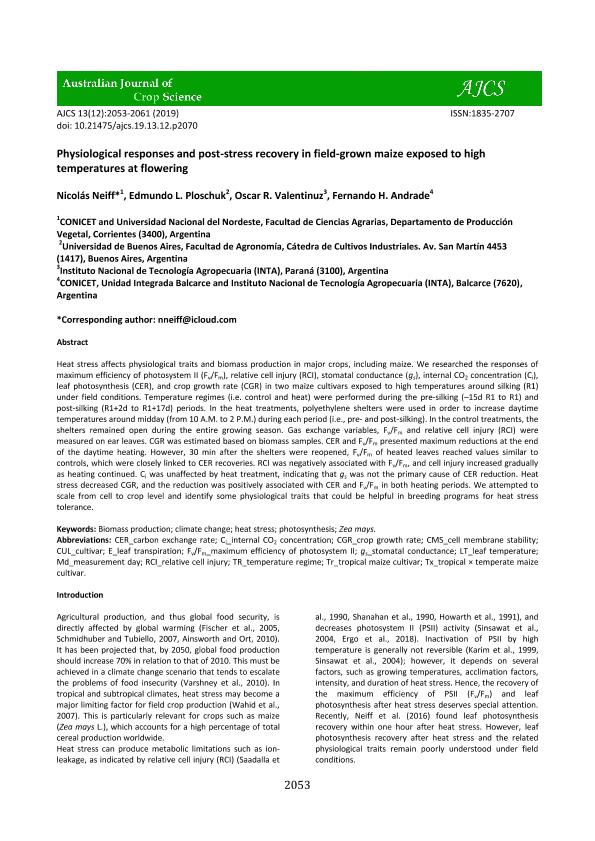Artículo
Physiological responses and post-stress recovery in field-grown maize exposed to high temperatures at flowering
Fecha de publicación:
12/2019
Editorial:
Southern Cross Publishing
Revista:
Australian Journal of Crop Science
ISSN:
1835-2693
e-ISSN:
1835-2707
Idioma:
Inglés
Tipo de recurso:
Artículo publicado
Clasificación temática:
Resumen
Heat stress affects physiological traits and biomass production in major crops, including maize. We researched the responses of maximum efficiency of photosystem II (Fv/Fm), relative cell injury (RCI), stomatal conductance (gs), internal CO2 concentration (Ci), leaf photosynthesis (CER), and crop growth rate (CGR) in two maize cultivars exposed to high temperatures around silking (R1) under field conditions. Temperature regimes (i.e. control and heat) were performed during the pre-silking (-15d R1 to R1) and post-silking (R1+2d to R1+17d) periods. In the heat treatments, polyethylene shelters were used in order to increase daytime temperatures around midday (from 10 A.M. to 2 P.M.) during each period (i.e., pre- and post-silking). In the control treatments, the shelters remained open during the entire growing season. Gas exchange variables, Fv/Fm and relative cell injury (RCI) were measured on ear leaves. CGR was estimated based on biomass samples. CER and Fv/Fm presented maximum reductions at the end of the daytime heating. However, 30 min after the shelters were reopened, Fv/Fm of heated leaves reached values similar to controls, which were closely linked to CER recoveries. RCI was negatively associated with Fv/Fm, and cell injury increased gradually as heating continued. Ci was unaffected by heat treatment, indicating that gs was not the primary cause of CER reduction. Heat stress decreased CGR, and the reduction was positively associated with CER and Fv/Fm in both heating periods. We attempted to scale from cell to crop level and identify some physiological traits that could be helpful in breeding programs for heat stress tolerance.
Palabras clave:
BIOMASS PRODUCTION
,
CLIMATE CHANGE
,
HEAT STRESS
,
PHOTOSYNTHESIS
,
ZEA MAYS
Archivos asociados
Licencia
Identificadores
Colecciones
Articulos(CECOAL)
Articulos de CENTRO DE ECOLOGIA APLICADA DEL LITORAL (I)
Articulos de CENTRO DE ECOLOGIA APLICADA DEL LITORAL (I)
Citación
Neiff, Nicolás; Ploschuk, Edmundo Leonardo; Valentinuz, Oscar Rodolfo; Andrade, Fernando Héctor; Physiological responses and post-stress recovery in field-grown maize exposed to high temperatures at flowering; Southern Cross Publishing; Australian Journal of Crop Science; 13; 12; 12-2019; 2053-2061
Compartir
Altmétricas




